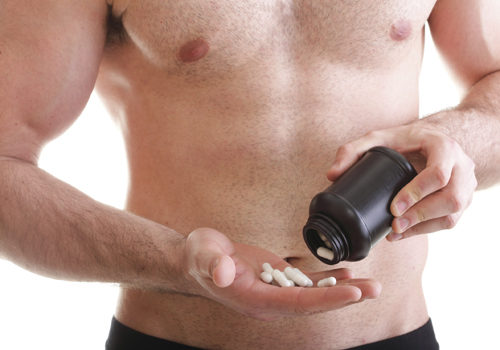
Though we should always keep in mind what makes us the same, there are lots of important differences between men and women. These differences start biologically, and as a result, certain health issues more frequently apply to men (or, as in the case of prostate health, exclusively apply). Let’s review the highest profile options in several of these areas.
Strength
Even if they are better off than the fabled 98-pound person, many men are interested in adding physical strength and bulk. Natural supplements can offer a leg up on this task.
The first option often presented is creatine. An organic acid naturally produced in the liver, creatine’s role is to provide energy to cells throughout the body, especially muscles (1). In addition to the body’s endogenous production, creatine can be obtained from foods and supplements.
Research indicates that creatine is both directly and indirectly responsible for increasing fat-free body mass. A study in the Journal of Sports Science and Medicine suggested that creatine supplements can increase maximum power and performance in high-intensity anaerobic repetitive exercise by as much as 15%. Working out more, of course, is going to lead to bigger muscles. In addition, increased creatine content in muscles is directly associated with greater body mass (1).
One review of creatine notes that while the form of creatine called creatine monohydrate has long been the focus of attention, many others are available in the sports nutrition/supplement market. This review also explained that not all forms of creatine are correlated with muscle gains because some trials did not involve subjects engaging in weight training while taking the supplements. The authors conclude that the majority of the evidence indicates creatine can enhance both athletic performance and the size of muscles (2).
Stepping outside the creatine box, protein is fundamental for muscle building. But, it is sometimes claimed that whey protein, or other protein sources found in the supplement market, do not necessarily fare better in supporting muscle growth than any other protein. There is evidence to contradict this, such as one study on older men that found whey protein stimulated muscle protein accretion more effectively than casein or casein hydrolysate (3). Those researchers attributed the difference to whey’s faster digestion rate, better absorption and higher amount of leucine, an amino acid.
Many other supplements have been convincingly linked with muscle gains, when used in conjunction with exercise. These include other protein sources such as the aforementioned casein, soy protein and egg protein. Plenty of protein powder products combine several protein sources for variety. Branch-chain amino acids (BCAAs), beta-alanine and glutamine are also frequently recommended for men aspiring to bulk up.
Heart
Most people do not need to be told by now that heart disease is the number one killer of men and women. But it must be emphasized that many statistics suggest men are at an even greater risk. For one thing, men’s arteries often develop atherosclerosis earlier than women’s (4). Men who die of cardiovascular disease are under 65 years old on average, while the average age for women trails by 6 years. Almost twice as many males die of conditions that affect the cardiovascular system compared to women, and 70–89% of all sudden cardiac events occur in men (5, 6).
This is why heart health supplements should be on tap for men, especially those with any family history of heart disease, or who struggle with lifestyle-related risk factors. Of course, men should first consult their physicians about their cardiovascular health risk before taking any new supplements.
Omega-3s are perhaps the leading candidate in the heart health supplement space. Fish oil maintains a sizable share of the market, though plant- or other marine-based sources (such as krill) are also viable ways to get heart-healthy omegas into the bloodstream and tissues. Eicosapentaenoic acid (EPA) and docosahexaenoic acid (DHA) are the two omega-3s found in abundance in marine sources; they also happen to lead the way when it comes to heart health benefits. The primary reason, scientists believe, is that these fatty acids help control excessive inflammation, which is a primary culprit in cardiovascular health issues (7).
Cholesterol-managing fiber, blood pressure-regulating garlic, heart-energizing coenzyme Q10 (CoQ10), and overall risk-lowering vitamin D round out a worthy list of top heart health supplements. Loading up on these and other heart-health supplements, depending on the type of risk being dealt with, is more than a good idea for men. It may be a lifesaver in the long run.
Prostate
For such a little thing, it’s surprising how often the prostate can become the source of major health issues. A walnut-sized gland specific to men, it rests below the bladder and surrounds the urethra (8). Potential prostate issues include benign prostatic hyperplasia (BPH), which is associated with symptoms like frequent and/or difficult urination, and prostate cancer. In BPH, the prostate enlarges, putting pressure on surrounding tissues including the bladder and urethra, which is the cause of the most common symtpoms. BPH crops up mostly in men over age 50.
Dietary supplements, particularly herbs and herbal extracts, have been studied for their ability to address or benefit those with prostate problems. Saw palmetto is the most renowned of these, but the evidence is mixed on its effectiveness. A number of small studies indicate saw palmetto could be effective for helping alleviate the urinary symptoms caused by BPH. But one large study found no difference between saw palmetto and a placebo for those with moderate-to-severe BPH, and there is also a lack of evidence that it can help reduce prostate-specific antigen (PSA) levels. PSA is produced by prostate cells, and high levels of PSA are correlated with prostate cancer risk (9).
Other herbal extracts, notably pygeum (Pygeum africanum), are thought to help with the symptoms of BPH. Scientific studies have found pygeum leads to improvements in nocturnia (need to urinate at night) and urine flow (10). Grass pollen (Secale cereale) is another contender, as it has been found to help reduce the amount of urine retained in the bladder, another issue faced by those with BPH.
Vitality
As they age, a significant number of men may go in search of ways to enhance their overall vitality and libido. Some may also be in the market for solutions for erectile dysfunction. Various herbals and other compounds that support testosterone, blood flow and related biological functions can help with these issues.
Though their level of effectiveness may not quite stack up, certain natural options can be considered alternatives to male sexual enhancers like Viagra. Ginseng is one of these options, though there are several types of ginseng to choose from, like Siberian and Asian. In general, ginseng is thought to help the body produce more nitric oxide, which is produced by prescription drugs in this category. Nitric oxide is responsible for the dilation of blood vessels, and so ramping up the body’s production of this compound may help with erectile issues (11). The amino acid L-arginine may also boost nitric oxide and has been found to fit the same profile.
For enhanced sex drive and a boost to sexual functions, men may want to turn to maca root. Native to Peru, it has traditionally been used as an aphrodisiac (11). Other similar options include eleuthero root and polyphenol-rich green tea. For an improvement to overall energy levels, men can look to a multivitamin specifically formulated for men, and other supplements designed to support their nutritional needs. B vitamins are of special importance to energy.
Testosterone therapy, and the idea that men should try to maintain their testosterone levels as they age, have been in the news lately. If men want to try to naturally boost testosterone (which could also help with that muscle building effort), you can share with them that evidence supports the role of zinc in regulating testosterone (12). WF
See www.wholefoodsmagazine.com/columns/consumer-bulletin for other Consumer Bulletins.
References
1. “What is Creatine? What are the Benefits of Creatine?” Medical News Today, Sept. 26, 2014, http://www.medicalnewstoday.com/articles/263269.php, accessed Apr. 21, 2015.
2. R. Cooper, et al., “Creatine Supplementation with Specific View to Exercise/Sports Performance: An Update,” Journal of the International Society of Sports Nutrition 9(1), 33 (2012).
3. B. Pennings, et al., “Whey Protein Stimulates Postprandial Muscle Protein Accretion More Effectively than do Casein and Casein Hydrolysate in Older Men,” Am J Clin Nutr. 93(5), 997-1005 (2011).
4. M. Hoffman, “6 Top Health Threats to Men,” WebMD, http://www.webmd.com/men/features/6-top-health-threats-men, accessed Apr. 21, 2015.
5. D. Zamora, “Men’s Top 5 Health Concerns,” WebMD, http://www.webmd.com/men/features/mens-top-5-health-concerns, accessed Apr. 21, 2015.
6. “Men and Heart Disease Fact Sheet,” Centers for Disease Control and Prevention, http://www.cdc.gov/dhdsp/data_statistics/fact_sheets/docs/fs_men_heart.pdf, accessed Apr. 21, 2015.
7. A. Stuart, “What to Know About Omega-3s and Fish,” WebMD, Oct. 17, 2011, http://www.webmd.com/diet/what-to-know-about-omega-3s-and-fish, accessed Apr. 21, 2015.
8. “Prostate Problems,” WebMD, http://www.webmd.com/men/guide/prostate-problems, accessed Apr. 21, 2015.
9. “Saw Palmetto,” WebMD, Aug. 3, 2013, http://www.webmd.com/prostate-cancer/saw-palmetto-and-the-prostate, accessed Apr. 21, 2015.
10. S.D. Ehrlich, “Benign Prostatic Hyperplasia,” University of Maryland Medical Center, http://umm.edu/health/medical/altmed/condition/benign-prostatic-hyperplasia, accessed Apr. 21, 2015.
11. J.L. Davis, “Natural Sex Boosters: Can You Rev Up Your Libido?” WebMD, http://www.webmd.com/vitamins-and-supplements/lifestyle-guide-11/natural-sex-boosters-can-you-rev-up-your-libido, accessed Apr. 21, 2015.
12. N.L. Shafiei, et al., “Effect of Zinc and Selenium Supplementation on Serum Testosterone and Plasma Lactate in Cyclist after an Exhaustive Exercise Bout,” Biol. Trace Elem. Res. 144(1-3), 454-62 (2011).
Published in WholeFoods Magazine, June 2015











